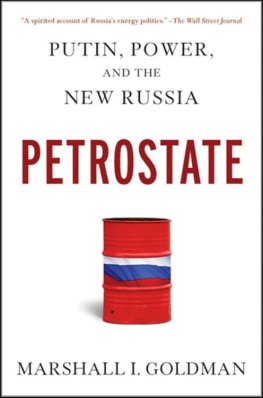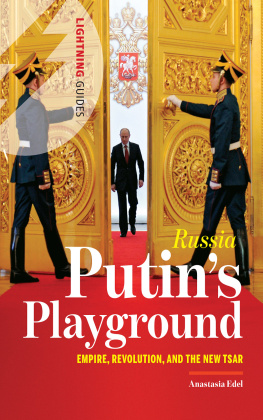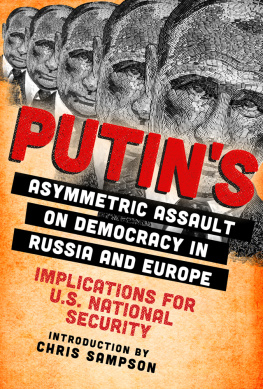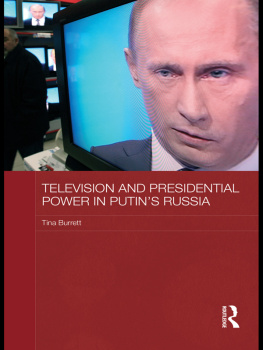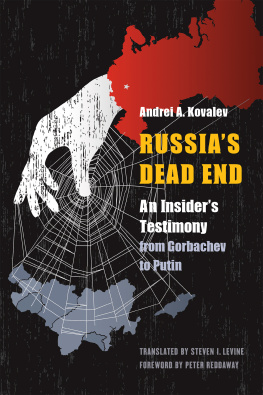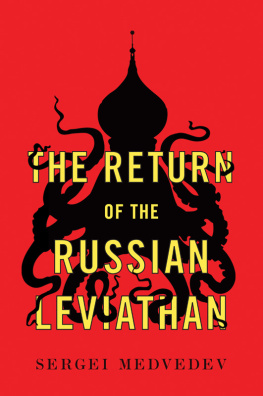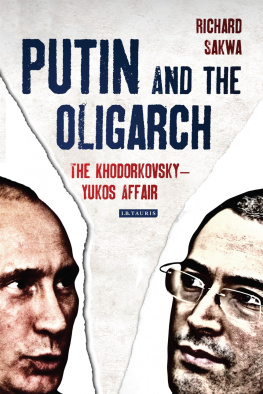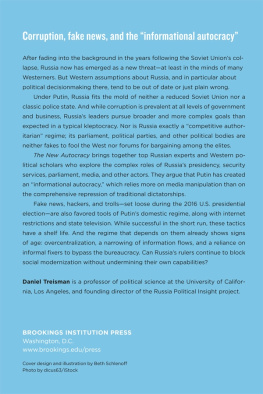
The State and Big Business in Russia
This book presents a study of the complex relationship between the Russian state and big business during Vladimir Putins first two presidential terms (20002008). Based on extensive original research, it focuses on the interaction of Russias political executive with the oligarchs. It shows how Putins crackdown on this elite group led big business to accept new rules of the game and how this was accompanied by the involvement of big business in policy formulation, particularly through the organisational vehicle of the Russian Union of Industrialists and Entrepreneurs (RSPP). It discusses why Yukos and its CEO Mikhail Khodorkovsky were targeted by Russias political authorities and the resultant consequences, namely the end of the relatively successful framework via which state-business relations had been managed, and its replacement by fear and mutual distrust, along with a vastly expanded role for the state, and state-related actors, in the Russian corporate sector. The book explores all these developments in detail and sets them against the context of continued trends towards greater authoritarianism in Russia.
Tina Jennings is a Foundation Fellow at St Antonys College, University of Oxford, and was a Research Fellow at the Colleges Centre for Russian and Eurasian Studies (20082018).
Routledge Contemporary Russia and Eastern Europe Series
Russias Food Revolution
The Transformation of the Food System
Stephen K. Wegren
The Sense of Mission in Russian Foreign Policy
Destined for Greatness!
Alicja Curanovi
Soviet Films of the 1970s and Early 1980s
Conformity and Non-Conformity Amidst Stagnation Decay
Edited by Marina Rojavin and Tim Harte
Europe, Russia and the Liberal World Order
International Relations after the Cold War
Timofei Bordachev
Russia after 2020
Looking Ahead after Two Decades of Putin
J. L. Black
The Russian Minorities in the Former Soviet Republics
Secession, Integration, and Homeland
Anna Batta
Tatarstans Autonomy within Putins Russia
Minority Elites, Ethnic Mobilization and Sovereignty
Deniz Din
The State and Big Business in Russia
Understanding KremlinBusiness Relations in the Early Putin Era
Tina Jennings
For more information about this series, please visit: www.routledge.com/Routledge-Contemporary-Russia-and-Eastern-Europe-Series/book-series/SE0766
The State and Big Business in Russia
Understanding KremlinBusiness Relations in the Early Putin Era
Tina Jennings

First published 2022
by Routledge
2 Park Square, Milton Park, Abingdon, Oxon OX14 4RN
and by Routledge
605 Third Avenue, New York, NY 10158
Routledge is an imprint of the Taylor & Francis Group, an informa business
2022 Tina Jennings
The right of Tina Jennings to be identified as author of this work has been asserted in accordance with sections 77 and 78 of the Copyright, Designs and Patents Act 1988.
All rights reserved. No part of this book may be reprinted or reproduced or utilised in any form or by any electronic, mechanical, or other means, now known or hereafter invented, including photocopying and recording, or in any information storage or retrieval system, without permission in writing from the publishers.
Trademark notice: Product or corporate names may be trademarks or registered trademarks, and are used only for identification and explanation without intent to infringe.
British Library Cataloguing-in-Publication Data
A catalogue record for this book is available from the British Library
Library of Congress Cataloging-in-Publication Data
A catalog record has been requested for this book
ISBN: 978-1-032-17095-4 (hbk)
ISBN: 978-1-032-17096-1 (pbk)
ISBN: 978-1-003-25179-8 (ebk)
DOI: 10.4324/9781003251798
Typeset in Times New Roman
by Newgen Publishing UK
In loving remembrance of my parents,
Michele and Anton Podplatnik
Once, however, the master took Yevsey to a grand house filled with innumerable beautiful things, marvellous weapons, and garments of silk and brocade He walked silently through the rooms for a long time, blinking in bewilderment and expectation. When they returned home, he asked the master, Whose are they?
They are state property the Tsars, the old man explained.
The boy asked another question. Who wore such coats and sabres?
Tsars, boyars, and other imperial people.
There are no such people today?
How so? Of course there are! You cant do without them. Only now they dress differently.
Again, the boy asked, Do I belong to the Tsar too?
Of course you do. In our country everything belongs to the Tsar. The whole earth is Gods earth, and the whole of Russia belongs to the Tsar.
Maxim Gorky, The Life of a Useless Man (1908)
Contents
Tables
Preface
I lived in Moscow for twelve uninterrupted years, between 1994 and 2006, allowing me an equal measure of Boris Yeltsin and Vladimir Putin. This followed an earlier sojourn in the USSR in 19901991 at Leningrad State University, where I studied on a graduate exchange scholarship for one academic year and where Putin had served as vice-rector for foreign students during that same year. During my subsequent years in Moscow I worked in investment banking during Russias several waves of privatisation, in financial journalism when Russian companies began to access the international capital markets, and as head of research for a European commercial bank focusing on Russian energy clients. Also during those dozen years, I researched and wrote a doctoral dissertation on Big Business and the State in Putins Russia, 20002004 for Oxford University (awarded in 2005), carrying my draft chapters back and forth on endless trips between Patriarchs Ponds in Moscow and Church Walk in Oxford. Following my doctorate, I was appointed by Sothebys to head its first representative office in Russia, which I opened in Moscow in 2006. Such an unusually privileged experience of total immersion in this milieu over a prolonged period afforded me a high degree of familiarity with my topic in the sense of having lived and worked within this extraordinary crucible, from witnessing first-hand the controversial loans-for-shares auctions in the mid-1990s to Khodorkovskys first criminal trial in 20042005, which I attended in Moscows Meshchansky District court a day that will remain with me as among the saddest I have experienced in all my time in Russia, if for nothing more than the image of a lone man locked inside a cage in an overflowing courtroom in the 21st century.
The research undertaken for this dissertation-turned-book during those early years of Putins presidency is complemented by extensive interviews I conducted with Russian businessmen, politicians and government officials of the last 25 years, all of whom played leading roles in the narrative that unfolds on these pages including Yeltsin-era privatisation minister Anatoly Chubais; leading economic reformer and acting prime minister under Yeltsin, the late Yegor Gaidar; former prime minister, foreign minister and head of the Russian foreign intelligence service (SVR) the late Yevgeny Primakov; former chief of staff of both Yeltsins and Putins Presidential Administration Alexander Voloshin; founder and long-time head of the RSPP, the late Arkady Volsky; former deputy prime minister and current head of the RSPP Alexander Shokhin; and former finance minister under Putin, Alexei Kudrin, among many others. It goes without saying that I have been exceedingly fortunate to have enjoyed the access that I did, for which I am profoundly grateful.


